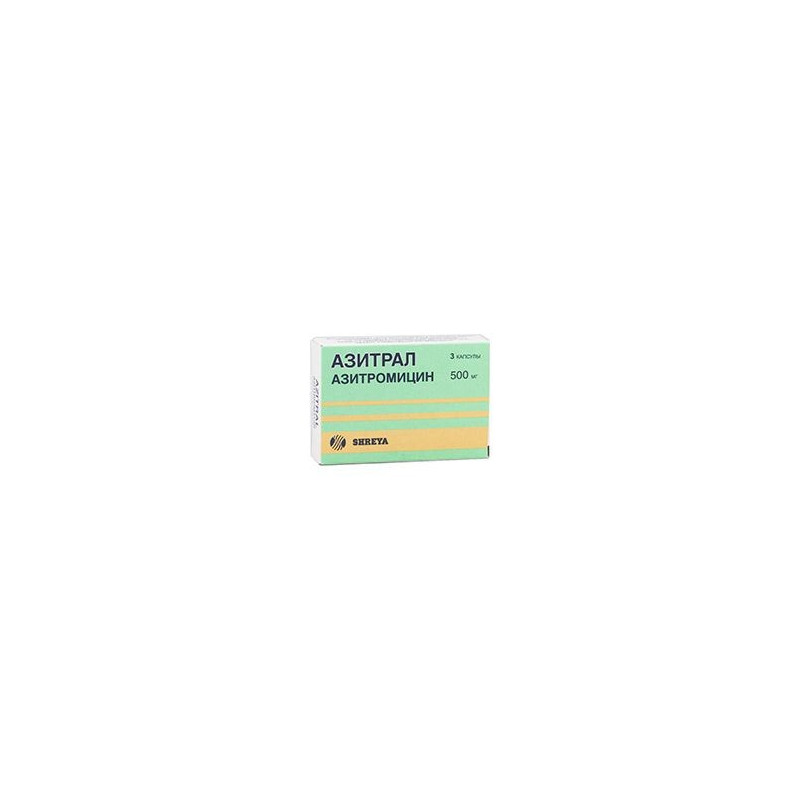



 All payments are encrypted via SSL
All payments are encrypted via SSL
 Full Refund if you haven't received your order
Full Refund if you haven't received your order
Infectious and inflammatory diseases caused by microorganisms sensitive to the drug:
- infections of the upper respiratory tract and upper respiratory tract (tonsillitis, sinusitis, tonsillitis, pharyngitis, otitis media);
- infections of the lower respiratory tract (bacterial and atypical pneumonia, bronchitis);
- scarlet fever;
- infections of the skin and soft tissues (erysipelas, impetigo, secondarily infected dermatosis);
- infections of the urogenital tract (gonorrheal urethritis and / or cervicitis);
- Lyme disease (borreliosis) - for the treatment of the initial stage (erythema migrans);
- gastric ulcer and duodenal ulcer associated with Helicobacter pylori (as part of combination therapy).
Gastrointestinal: nausea (3%), diarrhea (5%), abdominal pain (3%); dyspepsia, vomiting, flatulence, melena, cholestatic jaundice, increased activity of hepatic transaminases (1% or less). Children have constipation, anorexia, gastritis.
Cardiovascular: palpitations, chest pain (1% or less).
From the side of the central nervous system: headache, dizziness, drowsiness; in children, headache (with otitis media therapy), hyperkinesia, anxiety, neurosis, sleep disturbance (1% or less).
From the genitourinary system: nephritis, vaginal candidiasis (1% or less).
Allergic reactions: rash, photosensitivity, angioedema.
Other: increased fatigue, oral candidiasis; children have conjunctivitis, pruritus, urticaria.
- renal failure;
- liver failure;
- lactation period (breastfeeding);
- children's age up to 12 months;
- hypersensitivity to Azithromycin and other macrolide antibiotics.
with caution prescribed for arrhythmias (possible ventricular arrhythmia and prolongation of the QT interval), pregnancy, as well as children with severe impaired liver or kidney function.
In pregnancy, Azithral can be used when the intended benefit of such therapy significantly exceeds the risk that exists when using medicines during pregnancy.
When prescribing the drug during lactation, breastfeeding should be suspended for the duration of treatment.
Application for violations of the liver
The drug is contraindicated for use in liver failure.
Application for violations of kidney function
The drug is contraindicated for use in renal failure.
Use in children
Contraindications: children up to 12 months.
In case of a missed dose, the missed dose should be taken as early as possible, and the next ones - with an interval of 24 hours.
It should be borne in mind that after drug withdrawal, allergic reactions may persist in some patients, which requires appropriate therapy and medical supervision.
Between taking Azithral and antacid drugs is recommended to observe a break of at least 2 hours.
Symptoms: severe nausea, temporary hearing loss, vomiting, diarrhea.
Treatment: conducting symptomatic therapy.
Antacids (aluminum and magnesium), ethanol, food slow down and reduce the absorption of azithromycin.
When combined use of Warfarin and Azithral in the recommended doses, changes in prothrombin time were not detected, however, given that the interaction of macrolides and warfarin may increase the anticoagulant effect, control of the prothrombin time is necessary.
When combined, azithromycin increases the concentration of Digoxin.
With simultaneous use of azithromycin enhances the toxic effect of ergotamine and dihydroergotamine (vasospasm and dysesthesia).
When combined, azithromycin slows down the excretion and enhances the pharmacological effects of triazolam.
When combined, azithromycin slows down the excretion, increases plasma concentration and enhances the toxicity of cycloserine, indirect anticoagulants, methylprednisolone, felodipine.
Azithromycin, inhibiting microsomal oxidation in hepatocytes, slows down excretion, increases serum concentration and enhances the toxicity of Carbamazepine, terfenadine, cyclosporine, hexobarbital, ergot alkaloids, valproic acid, phenytoin, disopyramide, bromocryptin, isoprophthalmic acid, valproic acid, phenytoin, disopyramide, bromocryptin, isoprophin, alkopoids, hemoglobin.
When combined, lincosamines weaken the effectiveness of azithromycin, and tetracyclines and chloramphenicol increase.
Storage conditions
List B. The drug should be stored out of the reach of children, in a dry place at a temperature not exceeding 25 ° C.
